|
|
|
Sort Order |
|
|
|
Items / Page
|
|
|
|
|
|
|
| Srl | Item |
| 1 |
ID:
180190
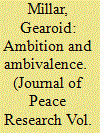

|
|
|
|
|
| Summary/Abstract |
For 50 years positive peace has served as an aspirational goal for many scholars and practitioners of peace. However, much recent scholarly literature evidences a substantial ambivalence toward this ambition, suggesting that prominent theories, policies and practices in the field have failed to support positive peace. This article argues that a key reason for this shortcoming is the field’s failure to respond adequately to the evolving character of conflict (latent and overt) related to technological, legal and economic changes associated with the consolidation of globalization over this period. This consolidation has served to shrink the distances between previously remote actors, to expand exponentially the influence of many institutions, norms, practices and projects as they penetrate new societies, to concentrate power into the hands of ever fewer actors, and to reify instead of deconstruct endemic inequality and marginalization within states, between states, and across the globe. The failure of the field to respond robustly to these changes also prompts concerns about its ability to face sweeping challenges soon to come related to technological innovation, climate change, demographic shifts, labour automation and the search for new governance models. This article, therefore, reaffirms the aspirational goals of peace and conflict studies by building on Lederach’s earlier Peacebuilding Triangle to propose a Trans-Scalar Peace System which would recognize the need for coherent and supplementary policies and actions across scales (global, regional, international, nation and local) and utilize a backward-mapping approach to promote a parity of esteem for actors, institutions and decisions at each scale which would, at the same time, privilege the voice of those with the most pertinent knowledge, experience and capacity for action in support of any given policy or practice. Such an approach would honour the lessons of the ‘local turn’ while developing a global trans-scalar peace system.
|
|
|
|
|
|
|
|
|
|
|
|
|
|
|
|
| 2 |
ID:
104136
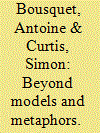

|
|
|
|
|
| Publication |
2011.
|
| Summary/Abstract |
The concepts, language and methods of complexity theory have been slowly making their way into international relations (IR), as scholars explore their potential for extending our understanding of the dynamics of international politics. In this article we examine the progress made so far and map the existing debates within IR that are liable to being significantly reconfigured by the conceptual resources of complexity. We consider the various ontological, epistemological and methodological questions raised by complexity theory and its attendant worldview. The article concludes that, beyond metaphor and computational models, the greatest promise of complexity is a reinvigoration of systems thinking that eschews the flaws and limitations of previous instantiations of systems theory and offers an array of conceptual tools apposite to analysing international politics in the twenty-first century.
|
|
|
|
|
|
|
|
|
|
|
|
|
|
|
|
| 3 |
ID:
166138


|
|
|
| 4 |
ID:
120477
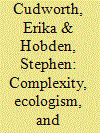

|
|
|
|
|
| Publication |
2013.
|
| Summary/Abstract |
Theorisations of the political in general, and international politics in particular, have been little concerned with the vast variety of other, non-human populations of species and 'things'. This anthropocentrism limits the possibilities for the discipline to contribute on core issues and prescribes a very limited scope for study. As a response to this narrow focus, this article calls for the development of a posthuman approach to the study of international politics. By posthuman, we mean an analysis that is based on complexity theory, rejects Newtonian social sciences, and decentres the human as the object of study. We argue for a decentring of 'the human' in our scholarship as imperative to understanding the complexity of the world. However, this approach also has a political incentive, which we describe as 'complex ecologism'.
|
|
|
|
|
|
|
|
|
|
|
|
|
|
|
|
| 5 |
ID:
120000
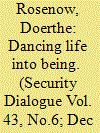

|
|
|
|
|
| Publication |
2013.
|
| Summary/Abstract |
A variety of scholars in critical security studies have recently argued that new modes of neoliberal world order are influenced by the emergence of complexity theory in the sciences, which manifests itself, for example, in the discourse of resilience. By contrast, this article aims to point at the number of governmental discourses and practices in which 'old' understandings of order are persistent. What will be argued is that such a set of practices can be found in the regulation of genetically modified organisms (GMOs), in which the dominant approaches and strategies still rely on an understanding of life that is bound to a more traditional episteme that expresses the desire for predictable management with clearly controllable effects. The article then moves on to discourses of resilience to show how they are equally characterized by this episteme. In unravelling the struggle that exists between 'old' and 'new' epistemes, the article aims to elaborate on the potential of complexity discourses for challenging particular governmental rationales, manifested in both the resilience context and the GMO controversy.
|
|
|
|
|
|
|
|
|
|
|
|
|
|
|
|
| 6 |
ID:
148777
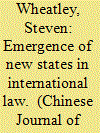

|
|
|
|
|
| Summary/Abstract |
Doctrinal controversies and the disputed international status of Kosovo and Palestine suggest that it is difficult for us international lawyers to know with any certainty when a new State has emerged in the international community. The contention here is that we should look to systems theory thinking—specifically complexity theory—to make sense of the law on statehood. Systems theory directs us to conceptualize the State in terms of patterns of communications adopted by law and politics actors and institutions and applied to subjects. Complexity tells us that these patterns develop without any central controller or guiding hand and that they exist only as a consequence of the framing of law and politics communications by a third party observer. The argument developed in this article is that these insights can provide the intellectual “scaffold” around which we can build our model of the international law on statehood.
|
|
|
|
|
|
|
|
|
|
|
|
|
|
|
|
| 7 |
ID:
189896
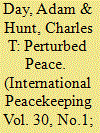

|
|
|
|
|
| Summary/Abstract |
This article explores the application of complexity theory to UN peacekeeping. To date, peacekeeping has been dominated by linear models of change, assuming that conflict settings can be addressed by elite-driven peace processes, gradual improvements to state institutional capacity, and development programming. However, this article argues that complexity theory offers a far more accurate and useful lens through which to view the work of peacekeeping: conflict settings represent complex, interdependent socio-political systems with emergent qualities giving them the capacity to self-organize via feedback loops and other adaptive activity. Self-organization means such systems are highly resistant to attempts to change behaviour via top-down or input-output approaches. In fact, peacekeeping itself is endogenous to the systems it is trying to change, often displaying the same kinds of self-organization typical of complex systems elsewhere. Drawing on experience working and conducting fieldwork in the UN peacekeping mission in Democratic Republic of the Congo, this article argues that UN peacekeeping operations should view themselves as actors within the complex conflict ecosystem, looking to enable transformational change from within, rather than impose liberal Western models from without.
|
|
|
|
|
|
|
|
|
|
|
|
|
|
|
|
| 8 |
ID:
143611
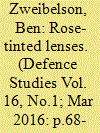

|
|
|
|
|
| Summary/Abstract |
Strategists and military professionals have previously questioned many of the methodological (theoretical underpinnings, the principles, and rules applied by the discipline) decisions associated with American military strategy, but the direction this essay takes is above and beyond the common methodological rivalries in how we pursue strategic desired future states. To get beyond methodological disputes entirely, we must consider thinking about our thinking as an organization on American strategy. Thus, this article hovers between philosophies, organizational theory, as well as our usually unquestioned belief in something called “strategy”. Questioning things about our basic understanding of the world tends to trigger strong organizational defense mechanisms, for good reason. Critical reflection at deep levels puts our worldview, and our role within it at stake. Nonetheless, as strategic disappointment emerges over multiple complex conflict developments, even the most cherished and guarded choices on how the world ought to work are ripe for critical inquiry. This essay examines the limited single strategic paradigm of the US defense industry and how the latest American National Security Strategy and Army Future Operating Concept (Win in a Complex World through 2030) presents a flawed strategic position. This essay presents valid alternative strategies that operate within different paradigmatic constructs.
|
|
|
|
|
|
|
|
|
|
|
|
|
|
|
|
|
|
|
|
|